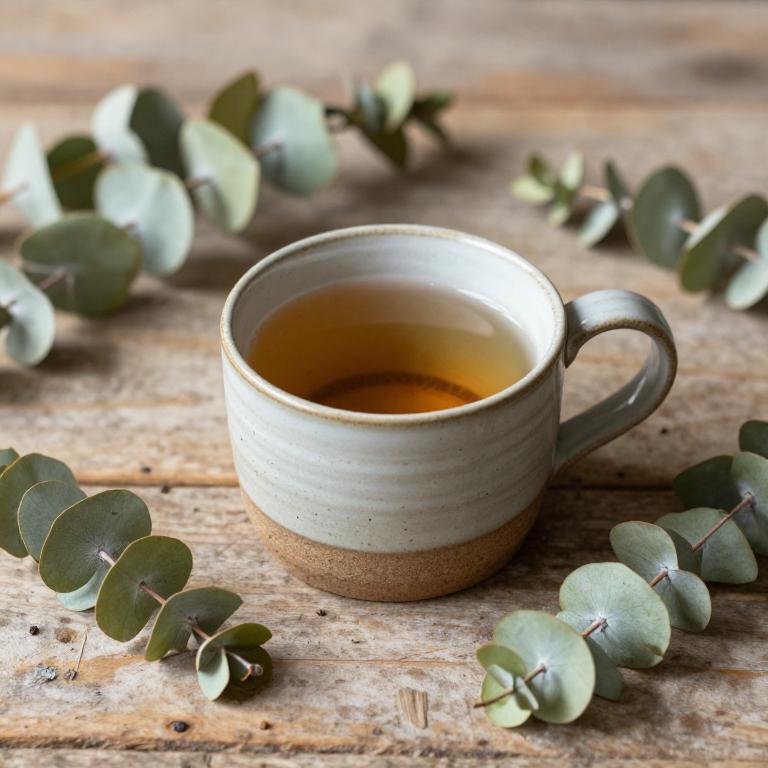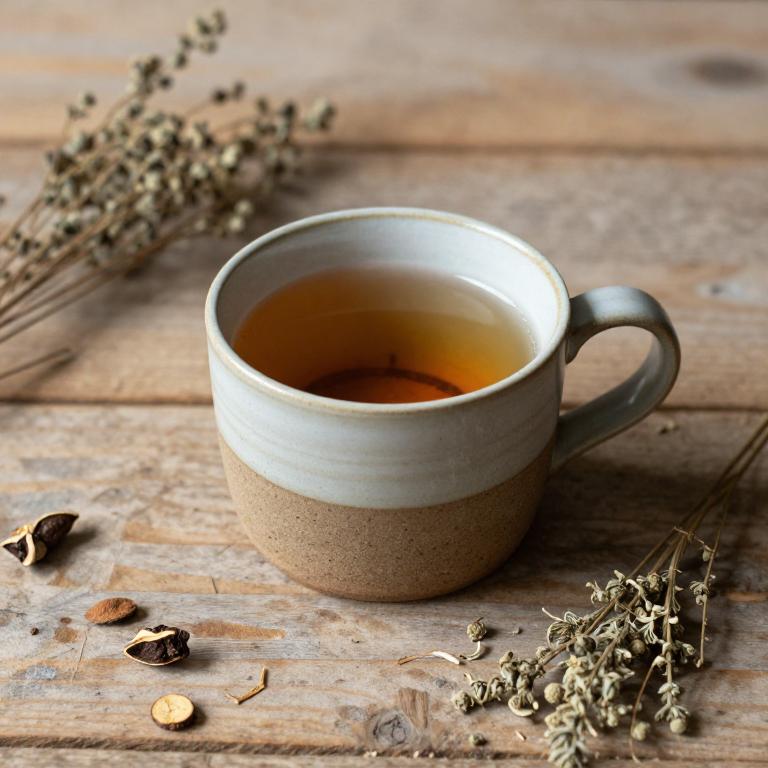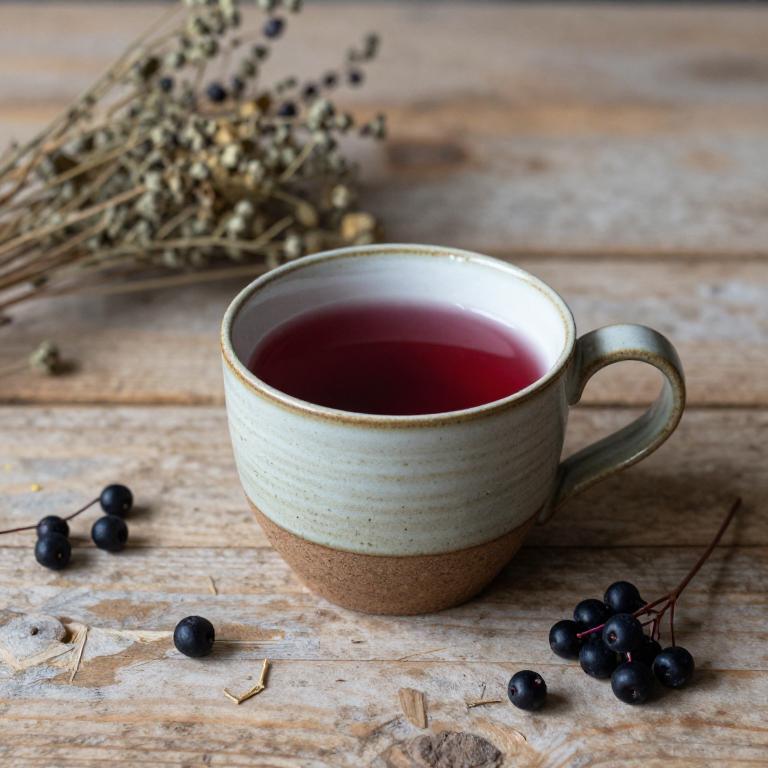10 Best Herbal Teas For Acute Bronchitis

Herbal teas can be a soothing and natural remedy for acute bronchitis, offering relief from symptoms such as coughing and congestion.
Commonly used herbs include echinacea, thyme, and ginger, which have anti-inflammatory and antimicrobial properties that may help reduce inflammation in the airways. These teas can also help loosen mucus and ease breathing, making them a supportive addition to conventional treatments. While they are generally safe, it's important to consult a healthcare provider before using herbal remedies, especially if you have underlying health conditions or are taking other medications.
Overall, herbal teas can complement a holistic approach to managing acute bronchitis by promoting comfort and aiding the body's natural healing process.
Table of Contents
- 1. Thyme (Thymus vulgaris)
- 2. Ginger (Zingiber officinale)
- 3. Eucalyptus (Eucalyptus globulus)
- 4. Chamomile (Matricaria chamomilla)
- 5. Ceylon cinnamon (Cinnamomum verum)
- 6. Stinging nettle (Urtica dioica)
- 7. Salvia (Salvia officinalis)
- 8. Black elderberry (Sambucus nigra)
- 9. Peppermint (Mentha piperita)
- 10. Rosemary (Rosmarinus officinalis)
1. Thyme (Thymus vulgaris)

Thymus vulgaris, commonly known as thyme, is a popular herb used in herbal teas to support respiratory health, particularly in cases of acute bronchitis.
The essential oils in thyme, especially thymol, possess strong antimicrobial and anti-inflammatory properties that can help reduce bronchial irritation and combat respiratory infections. When brewed into a tea, thyme can soothe coughing and ease mucus production, providing relief from the symptoms of acute bronchitis. It is often combined with other herbs like eucalyptus or ginger to enhance its therapeutic effects.
However, it is important to consult a healthcare professional before using thyme tea, especially for individuals with known allergies or those taking medications.
2. Ginger (Zingiber officinale)

Zingiber officinale, commonly known as ginger, is often used in herbal teas to support respiratory health, including in cases of acute bronchitis.
The active compounds in ginger, such as gingerol and shogaol, possess anti-inflammatory and antioxidant properties that may help reduce airway inflammation and mucus production. Drinking ginger tea can help soothe the throat, ease coughing, and provide a warming effect that may alleviate bronchial irritation. It is typically consumed warm, often combined with honey or lemon to enhance its soothing qualities.
While ginger tea is generally safe and may offer symptomatic relief, it should not replace professional medical advice or treatment for acute bronchitis.
3. Eucalyptus (Eucalyptus globulus)

Eucalyptus globulus, commonly known as eucalyptus or mountain gum, is widely used in herbal teas to support respiratory health, particularly for acute bronchitis.
The essential oils in eucalyptus, especially cineole, help to reduce inflammation and ease congestion in the airways. Drinking eucalyptus globulus herbal tea can promote easier breathing by loosening mucus and acting as a natural decongestant. It is often combined with other herbs like thyme or licorice to enhance its expectorant properties.
While generally safe when consumed in moderation, it is advisable to consult a healthcare provider before using eucalyptus tea, especially for those with allergies or chronic respiratory conditions.
4. Chamomile (Matricaria chamomilla)

Matricaria chamomilla, commonly known as chamomile, is a herbal tea often used for its calming and anti-inflammatory properties.
While it is traditionally used for digestive issues and mild anxiety, some studies suggest it may offer supportive benefits for respiratory conditions like acute bronchitis due to its potential to reduce inflammation and soothe irritated airways. Chamomile tea can help alleviate symptoms such as coughing and throat irritation, making it a gentle option for those seeking natural relief. However, it is important to note that chamomile should not replace conventional medical treatment for acute bronchitis, especially in severe cases.
As with any herbal remedy, it is advisable to consult a healthcare professional before use, particularly for individuals with allergies or existing medical conditions.
5. Ceylon cinnamon (Cinnamomum verum)

Cinnamomum verum, commonly known as true cinnamon, is often used in herbal teas to support respiratory health, including in cases of acute bronchitis.
The essential oils in cinnamon, particularly cinnamaldehyde, possess antimicrobial and anti-inflammatory properties that may help reduce bronchial irritation and mucus production. When brewed as a tea, cinnamon can soothe the throat and ease coughing, providing symptomatic relief. However, it is important to note that while cinnamon tea may offer comfort, it should not replace medical treatment for acute bronchitis.
As with any herbal remedy, individuals should consult with a healthcare provider before using cinnamon tea, especially if they have allergies or are taking other medications.
6. Stinging nettle (Urtica dioica)

Urtica dioica, commonly known as stinging nettle, is a herbal plant that has been traditionally used for its medicinal properties, including its potential benefits in supporting respiratory health.
When brewed into a herbal tea, Urtica dioica may help alleviate symptoms of acute bronchitis by reducing inflammation and soothing irritated airways. The tea is believed to act as a mild expectorant, helping to loosen mucus and ease coughing, which is a common symptom of bronchitis. It also contains antioxidants and anti-inflammatory compounds that may support the body’s natural healing processes.
While Urtica dioica herbal tea is generally considered safe for most people, it is advisable to consult with a healthcare provider before using it, especially for those with pre-existing medical conditions or who are taking other medications.
7. Salvia (Salvia officinalis)

Salvia officinalis, commonly known as sage, has been traditionally used in herbal teas to support respiratory health, including in cases of acute bronchitis.
The tea is believed to have antimicrobial and anti-inflammatory properties that may help reduce symptoms such as coughing and mucus production. When prepared by steeping the dried leaves in hot water, sage tea can provide a soothing effect on the throat and lungs. It is often recommended as a natural complement to conventional treatments, though it should not replace medical advice.
However, individuals with certain health conditions or those taking medications should consult a healthcare provider before using sage tea.
8. Black elderberry (Sambucus nigra)

Sambucus nigra, commonly known as European elderberry, is often used in herbal teas to support the immune system and alleviate symptoms of acute bronchitis.
The berries contain high levels of antioxidants, vitamins, and anti-inflammatory compounds that may help reduce respiratory inflammation and ease coughing. When brewed as a tea, sambucus nigra can soothe the throat and provide a warming effect, which is beneficial for those suffering from bronchial irritation. However, it is important to consult a healthcare provider before using elderberry tea, especially for individuals with chronic conditions or those taking medications.
While it may offer some relief, it should not replace conventional medical treatment for acute bronchitis.
9. Peppermint (Mentha piperita)

Mentha piperita, commonly known as peppermint, is often used in herbal teas to help alleviate symptoms of acute bronchitis.
The essential oils in peppermint, particularly menthol, have expectorant properties that can help loosen mucus and ease coughing. Peppermint tea may also provide a soothing effect on the respiratory tract, reducing irritation and inflammation. It is generally considered safe for most adults when consumed in moderate amounts, though it should be avoided by those with certain health conditions or allergies.
While it can be a helpful complementary remedy, it is important to consult a healthcare provider for proper diagnosis and treatment of acute bronchitis.
10. Rosemary (Rosmarinus officinalis)

Rosmarinus officinalis, commonly known as rosemary, is a herbal plant that has been traditionally used for its aromatic and therapeutic properties.
Rosemary herbal tea is often recommended for its potential to support respiratory health and may help alleviate symptoms of acute bronchitis by acting as a mild expectorant and anti-inflammatory agent. The essential oils in rosemary, particularly cineole and camphor, are believed to help clear mucus from the airways and reduce bronchial irritation. While it is not a cure for acute bronchitis, rosemary tea may provide symptomatic relief when consumed as part of a holistic approach to treatment.
As with any herbal remedy, it is advisable to consult with a healthcare provider before use, especially for individuals with existing health conditions or those taking other medications.